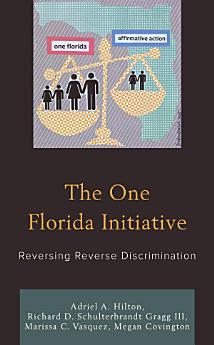The One Florida Initiative: Reversing Reverse Discrimination
Adriel A. Hilton · Richard D. Schulterbrandt Gragg III · Marissa C. Vasquez · Megan Covington
Jul 2021 · Bloomsbury Publishing PLC
Ebook
130
Pages
reportRatings and reviews aren’t verified Learn More
About this ebook
In this sixty-seventh anniversary year of the groundbreaking Supreme Court decision in the Brown v. Board of Education case that outlawed segregation in the nation’s public schools, research reveals that schools have undergone significant re-segregation. The anguish that many of us feel about this incredible failure of public policy underscores the layered aspect of achieving racial equality in America. In Florida, and across the nation, the steps that have been taken to implement affirmative action in higher education have been under constant attack by conservatives, and a series of actions by various state and federal courts have resulted in reduced access and enrollment of students of color in several states. In 1999, Governor Jeb Bush used his authority to redefine affirmative action in his state by issuing an executive order that established the One Florida Initiative (OFI). Bush’s claim that the OFI was intended to increase diversity and opportunities for people of color in Florida’s state university system appears to be contradicted by findings that minority representation actually decreased in most of the state universities after the policy was implemented.
Hilton and colleagues provide a cogent analysis of the effects of the OFI on enrollment patterns in the state’s public law schools to help us understand how changes in public policy can have detrimental effects on particular communities. The research is both enriched and complicated by the inclusion of the two law schools: Florida A&M and Florida International Universities, both of which are minority-serving institutions (MSIs). These schools were developed independently of the OFI but had a potential effect on the level of diversity that can be calculated across the system. The use of critical race theory offers an approach that will prove unnerving to some readers, but is one that provided insights that may not have been revealed through a different framework.
Hilton and colleagues provide a cogent analysis of the effects of the OFI on enrollment patterns in the state’s public law schools to help us understand how changes in public policy can have detrimental effects on particular communities. The research is both enriched and complicated by the inclusion of the two law schools: Florida A&M and Florida International Universities, both of which are minority-serving institutions (MSIs). These schools were developed independently of the OFI but had a potential effect on the level of diversity that can be calculated across the system. The use of critical race theory offers an approach that will prove unnerving to some readers, but is one that provided insights that may not have been revealed through a different framework.
About the author
Adriel A. Hilton is vice chancellor for student affairs and enrollment management at Southern University at New Orleans.
Richard D. Schulterbrandt Gragg III is professor of environmental science and policy in the School of the Environment at Florida A&M University in Tallahassee, Florida.
Marissa C. Vasquez is assistant professor of postsecondary educational leadership in the Department of Administration, Rehabilitation, and Postsecondary Education (ARPE) at San Diego State University.
Megan Covingtonis a research associate at Frederick D. Patterson Research Institute at the United Negro College Fund.
Richard D. Schulterbrandt Gragg III is professor of environmental science and policy in the School of the Environment at Florida A&M University in Tallahassee, Florida.
Marissa C. Vasquez is assistant professor of postsecondary educational leadership in the Department of Administration, Rehabilitation, and Postsecondary Education (ARPE) at San Diego State University.
Megan Covingtonis a research associate at Frederick D. Patterson Research Institute at the United Negro College Fund.
Rate this ebook
Tell us what you think.
Reading information
Smartphones and tablets
Install the Google Play Books app for Android and iPad/iPhone. It syncs automatically with your account and allows you to read online or offline wherever you are.
Laptops and computers
You can listen to audiobooks purchased on Google Play using your computer's web browser.
eReaders and other devices
To read on e-ink devices like Kobo eReaders, you'll need to download a file and transfer it to your device. Follow the detailed Help Center instructions to transfer the files to supported eReaders.





